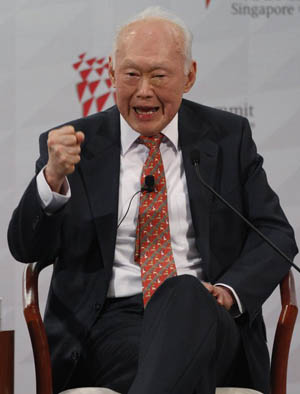BANGKOK — Former Singapore Prime Minister Lee Kuan Yew told US officials that the Burmese military rulers are “dense” and “stupid,” saying that talking to the regime was akin to “talking to dead people,” according to documents released by WikiLeaks this week.
Ridiculing the junta generals' mismanagement of what he termed Burma's resource-laden economy, Lee said that the US should approach Indonesian President Susilo Bambang Yudhoyono to act as an interlocutor with the Burmese junta, or failing that, sound out Vietnam as a possible mediator. Dismissing his own suitability for the job, Lee said that he was perceived as too close to the US for the junta's liking.
 |
| In this November 13, 2009 file photo, Singapore's Minister Mentor Lee Kuan Yew speaks at the APEC CEO Summit in Singapore. (Photo: Reuters) |
Lee's comments were made to then US Ambassador to Singapore Patricia Herbold in Oct. 2007 as the Burmese dictatorship crushed the monk-led “Saffron Revolution” protests taking place in cities across the country. A confidential briefing on a 2007 conversation between Lee and US officials was released by WikiLeaks this week.
Earlier in 2007, China facilitated talks between the US and the Burmese government, with Beijing's diplomats suggesting that the US deal directly with junta chief Snr-Gen Than Shwe, according to the documents released by WikiLeaks.
In a March 2007 meeting between Assistant Foreign Minister Cui Tankai and recently-departed US Ambassador to Thailand Eric John—who was then Deputy Assistant Secretary for Southeast Asian Affairs in the Bureau of East Asian and Pacific Affairs—the Chinese representative said that if the US wanted to make a difference in Burma, it should engage directly with Burma's apex senior-general. According to the March 2007 meeting transcript, China had repeatedly urged the Burmese junta to release political prisoners and to engage with the ethnic minority groups to promote national reconciliation.
While Lee appeared to find the Burmese rulers difficult to deal with, Chinese diplomats had a more benign view. In a meeting held in Beijing on October 14, 2009, the Director-General of Asian Affairs Department at China's Ministry of Foreign Affairs Yanyi Yang told US envoy Kurt Campbell that Than Shwe is “easy-going” and not difficult to engage in conversation, according to words attributed to her by an American diplomat who attended the meeting. Than Shwe holds the US in high regard, said Yang, who believed that the junta was “not seeking enemies.”
More than year ahead of the Nov. 7, 2010 election, which the Burmese junta front party known as the Union Solidarity and Development Party (USDP) is alleged to have rigged in its favor, Yang told Campbell that Burma “had expressed its commitment multiple times to free and fair elections in 2010,” and “had taken positive steps in advancing the democratization process.”
Going further, Yang said that “the regime was emphasizing economic development and paying increased attention to the needs of the Burmese people, particularly in the wake of Cyclone Nargis,” according to the US Embassy notes. In contrast, speaking months before the May 2008 cyclone which killed over 140,000 Burmese, Singapore's Lee said that Burma's generals had mismanaged the country's natural resources, saying that China had “heavily penetrated” the Burmese economy.
According to the American account of her meeting with Campbell, Yang “asserted that the junta was committed to building a peaceful, modern, democratic Burma” and that the Burmese rulers “viewed positively the advice of the international community and recently had taken positive steps, including meetings by top Burmese officials with UN leadership and a meeting between Snr-GenThan Shwe and Senator Jim Webb.”
Webb traveled to Burma in August 2009, securing the release of American John Yettaw, whose unannounced visit to Aung San Suu Kyi's Rangoon home led to an 18 month extension to the opposition leader's house arrest. Suu Kyi was released on Nov. 13.
In March 2007, the Chinese diplomats told their US counterparts that the Burmese rulers were open to talking to Suu Kyi, suggesting that they had sought to instigate a dialogue with the National league for Democracy (NLD), Suu Kyi's now-defunct opposition party.

